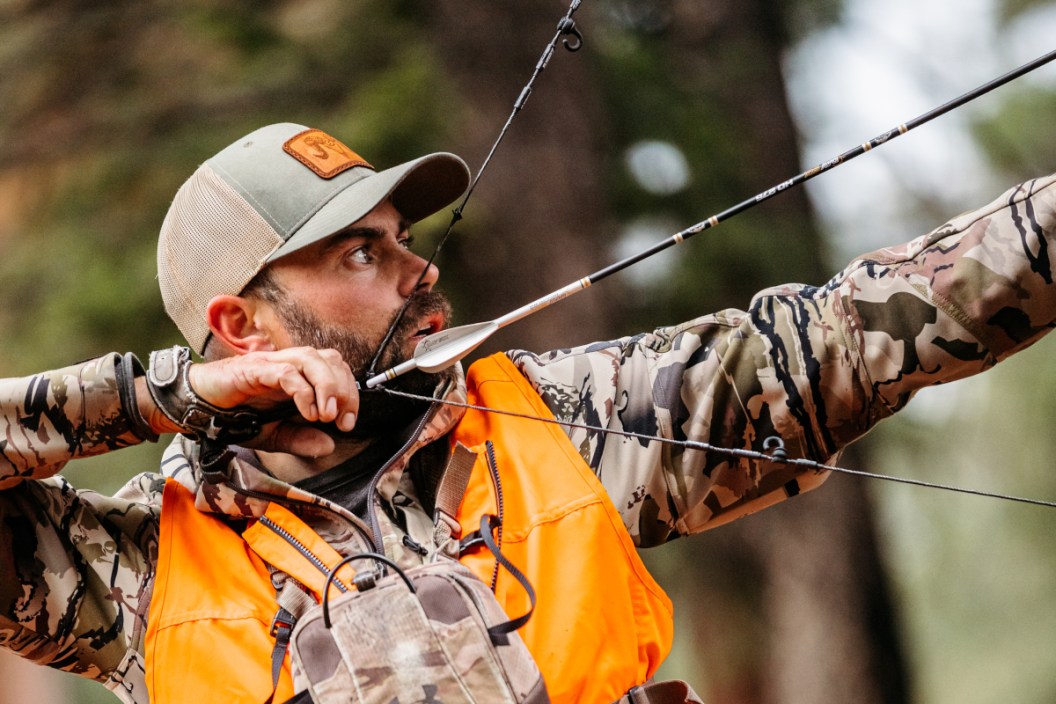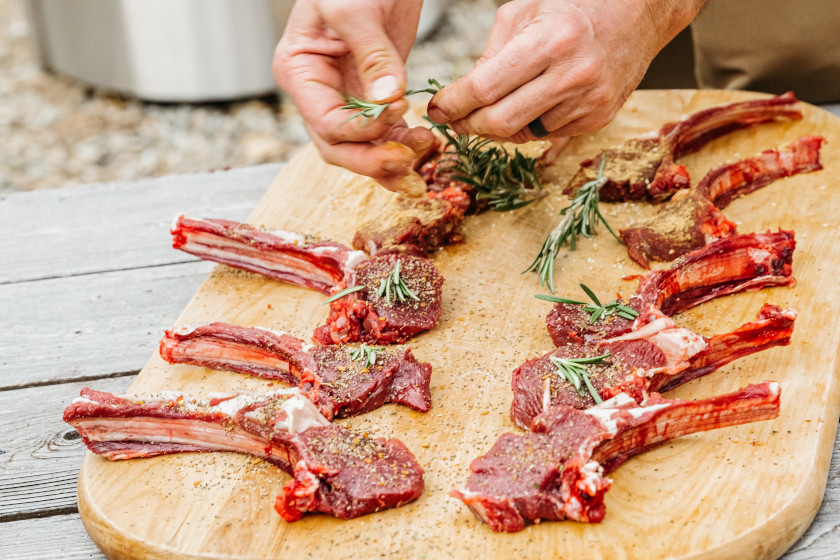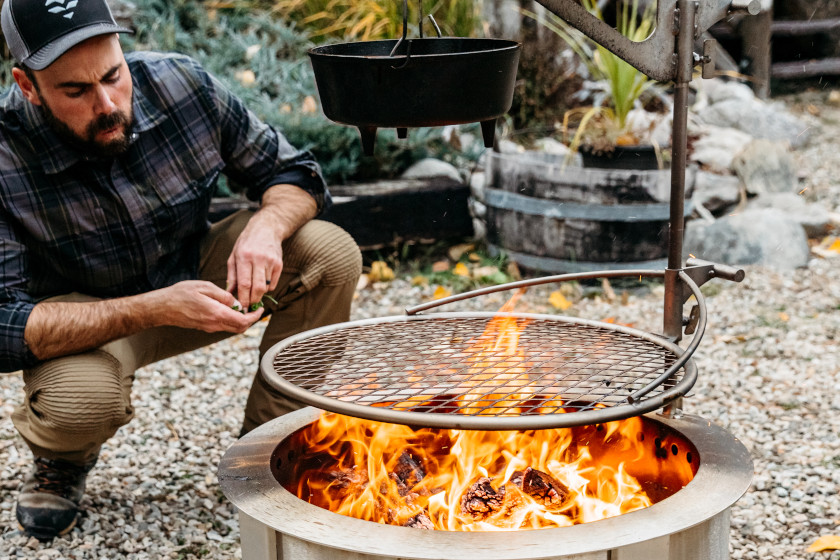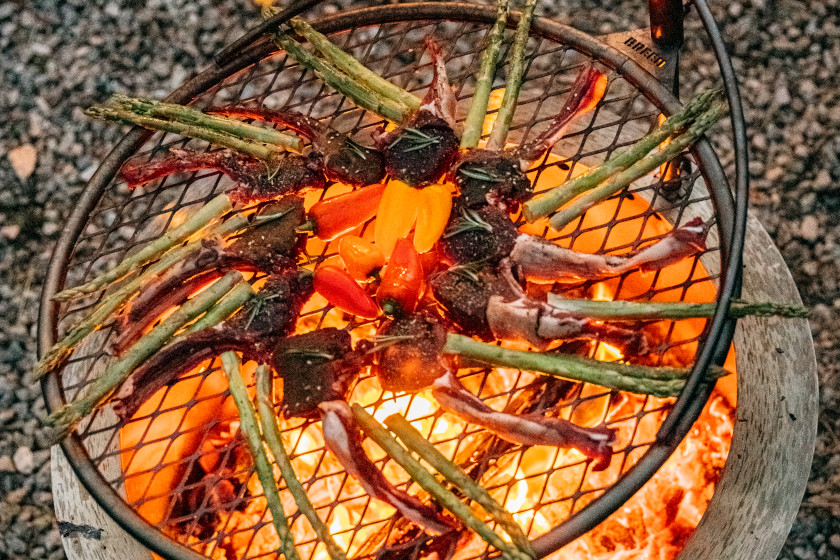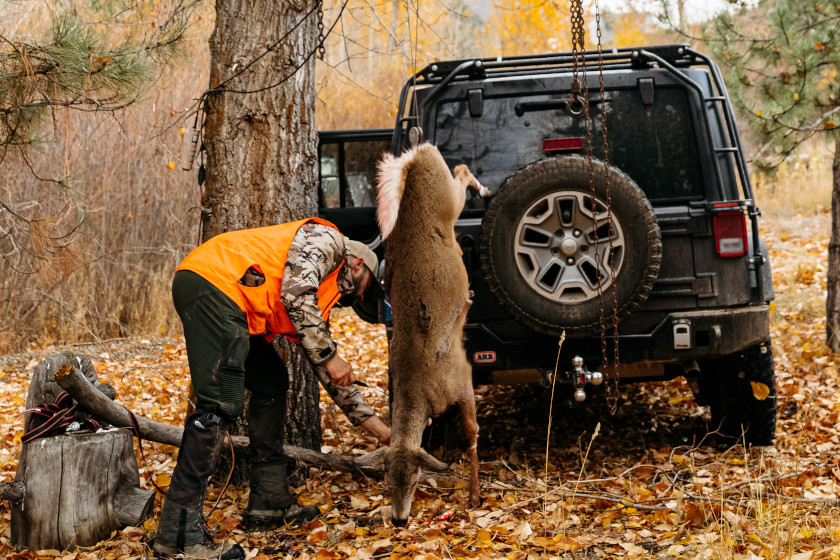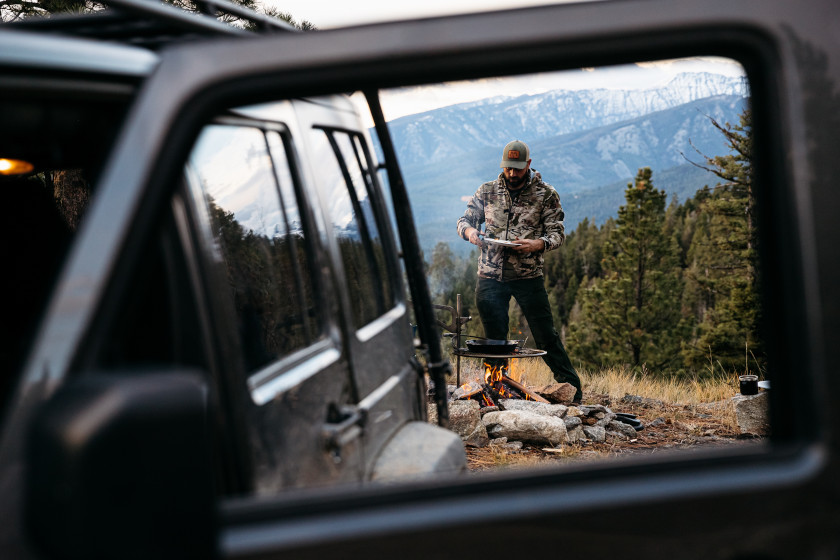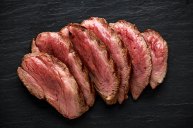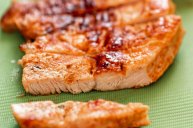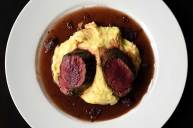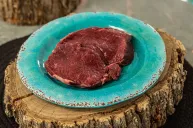Remi Warren talks about the field to table concept and trends in outdoor cooking.
When it comes to hunting game animals for meat, it's safe to say that things aren't like they used to be. There are hunters who will argue that some of us have gone soft, and that hunting has taken steps down skills-wise. This is thanks to the advancements in modern hunting technology, like smartphone scouting and ozone scent elimination.
However, the act of cooking wild harvested food is one aspect that, frankly, needed updating. The methods we use to prepare and cook have made gigantic leaps and bounds into the 21st century.
It's safe to say we have better knowledge at our fingertips, better and more accessible recipes, and superior cooking gear than our grandfathers and great-grandfathers ever had. As a result, wild game cooking has reached new heights, and is producing better meals than those old-timers probably could have ever dreamed possible. It's also helping bring newcomers into the hunting community, which is always a good thing.
Noted hunting guide, writer, conservationist, and TV personality Remi Warren has noticed these winds of change, and for him, they fit perfectly into an outdoor lifestyle that's all about making wild game meat a bigger part of a hunter's life.
We recently spoke with Warren, and he filled us in on
"There's no point in buying meat."
Warren moved to Montana when he was young and quickly jumped into becoming a hunting guide head-first, opening his own Outfitting business there by the age of 22. The skills he gained from hundreds of hours in the wilderness led to him appearing on the Outdoor Channel and on episodes of the MeatEater.
For Warren, it didn't make much sense to buy meat from a store when there was a bounty of animals waiting in the wilds for those willing to work for it. As he grew his tracking and hunting skills in the mountains and backcountry, he started making all his meals with wild game meat. Now he eats it every day.
There was just one problem that needed solving. The old-school ways of cooking venison or elk left a lot to be desired. Some of the first wild game meals he had were prepared by his father using recipes from his grandfather.
"He wasn't very good at cooking," Warren told me with a laugh. "Over the years I've taught him and he's great at it now. For a long time, it was just the recipes the way his dad did it, and the way his dad did it, and I wouldn't say they were good."
Most people can probably relate. We all know someone who has had a bad experience with venison or other wild game meats. The problem could be complaints about gaminess, or just an overall toughness to the meat.
"When I was growing up, the way wild game was cooked, it wasn't actually very good," Warren said. "It was always over-done, and it was only a couple of recipes."
One thing that quickly opened Warren's eyes to how wild game meat could be prepared was when he encountered a Greek method of cooking lamb. The lamb was prepared by skewering pieces of the organs like the heart and liver. Then lemon, thyme, and olive oil were added, and it was roasted over an open fire.
Given how gamey lamb can turn out if not cooked properly, it got the gears turning in Warren's head. He quickly applied similar tactics to venison. It became obvious that old-school ways of thinking may be holding back the true potential for wild game meat. He started getting creative, experimenting, and finding new ways to prepare wild game that more closely aligned with traditional ways of cooking.
"Once I did that, it completely changed the way I looked at wild game, and put a lot of emphasis on the preparation, and developing these recipes, and really understanding how to cook it," Warren said.
Warren said about the only meat he does buy these days is pork, and that's just to add a little fat to certain recipes.
As his passion for cooking has developed, so too has a desire to educate others on the benefits of wild game meat. Even more so, he learned how to be creative with it, especially for people who were reluctant to try wild game again after a previous bad experience.
"I could cook them something and they'd say 'Wow, this one of the best things I've ever eaten,'" Warren said. "That was always my goal, and so over the years I've really developed a passion for cooking and figuring out ways to create awesome meals that anybody can enjoy."
Anyone Can Figure It Out
When Warren started cooking his own meals using wild game, he admits it took him a while to get good at it. He thinks all the resources available to hunters today are going to make it easier for newbies to jump in and figure it all out.
"For me it took a long time because I didn't really have anybody who knew how to cook wild game, but there's so much information out there now, that I think the learning curve is dramatically decreased," he said.
In Warren's opinion, it goes beyond simply following a recipe precisely. He believes most people can improve their wild game meals simply by understanding the things to pay close attention to while prepping the meals. One of the bigger problems is overcooking. When he was younger, most of the wild game cooks he knew all over-cooked their meals. These days, especially when cooking over his Breeo fire pit in the backyard, Warren is extremely conscious of the amount of heat he uses. He says controlling temperature is key.
"I like to sear the outside hot and fast," Warren said. "But you don't want to get too close to the fire and burn it, and have the inside be too rare. So, I try to gauge. I'll place it over the fire, depending on how hot the fire is, and kind of adjust the temperature a little bit just by moving it closer or farther away from the fire."
Not that every wild game recipe needs to be cooked so quickly either. It depends on the situation. He described how he recently made some venison tacos.
"Just the other day I put two whitetail front shoulders in a Dutch oven, and then put it over the fire and just let it slow roast all day," Warren said. "By evening we were able to shred that, it was pretty simple, just some onions, some garlic, and some enchilada sauce in a cast iron pot, and just slow roast that over the fire while we were out there anyway just hanging out."
Warren also likes to look outside the box from the traditional old-timer recipes. He believes modern wild game cooking offers so many more options than that.
"That was the thing that always boggled my mind, how limited it was," Warren said. "You have steaks, you have chops, and you have badly cooked roasts, and you have birds stewed and overcooked in cream of mushroom soup, and that was it. It was like, 'Why is this our only option?'
"Just the other day we made venison jalapeño cheese corndogs," Warren said. "It's like, why not? You know? Everything that you normally eat is just as good or better made with wild game meat. The variety is kind of endless."
To expand on that, Remi referenced using wild game in breakfast meals, something that isn't always talked about or easy to do. A few days prior to our interview, Warren had axis deer chops with eggs for breakfast. He's also done steak and eggs using elk meat as well as venison sausage. He mentioned breakfast burritos using wild game as another option.
When he does incorporate eggs, Warren knows exactly where those are coming from too. He gets his from his brother who raises chickens.
It's all about experimentation, creativity, and an understanding that wild game can find its place in nearly every meal, all year long, and be plenty satisfying.
Cooking Over Fire
Warren's favorite way to prepare wild game meat is over a good wood fire. He says the process of cooking a meal in the backyard over his Breeo fire pit is wholly unique to this old-school way of cooking, and he's using it to modernize his meals.
"I love cooking over wood because it imparts a little bit of flavor and a little bit of texture you don't get over the stove," Warren said.
He often uses his grill to sear steaks over an open fire. In fact, elk steaks cooked this way are his wife's favorite thing that he prepares.
"I like to cook it in whole pieces, so I'll take a quarter of a backstrap and will cook it over the fire," Warren said. "Pretty simple seasonings. Sometimes I'll marinate it in olive oil, rosemary, a lot of garlic, pepper, and some other Montreal-type seasonings. I'll just throw that over the grate, over the Breeo, or over the sear plate, and just sear it hot and fast."
Warren prepared some steaks like that for lunch the same day the previously-mentioned venison shoulder tacos were slow cooking. With the right kind of equipment and Breeo's adjustable and versatile outdoor cooking gear, it's easy to see the range of cooking methods you can pull off with a wood fire.
Beyond that, it's also about the social aspects of hanging around the flames, and using a fire pit as a gathering area. In many ways, Warren says it's like bringing the experience of hunting camp to his backyard.
"Even throughout the year I like to bring that home as well, that's one of the reasons I like cooking over wood in some way at home," Warren said. "Because it kind of brings that outdoor experience to the home, to the table, for people who weren't there. It's a subtle flavoring technique that gives a nod to the hunting experience and being out in the field where the animal came from."
Winning Over the Picky Eaters
It can be extremely hard to get someone to try wild game meat again if they've already had a negative experience with it. Fortunately, this is something Warren has had some experience with. While elk is often his go-to meat for people in this scenario, he believes the type of dish you prepare is going to play a larger role in changing someone's mind about wild game than the type of animal served. He says it mostly depends on how adventurous the eater is, and what their eating habits are like.
"I always try to figure out what kind of food they like and make something with wild game in that so it's very familiar," Warren said. "If they're standard burger people, then I'll make an elk burger."
He also finds that tacos and burritos are good go-to options for people who are wary about venison and other wild game meats. It doesn't hurt to get a little creative, especially with something a person has never tried venison or other wild game meats before. As an example, he noted that he recently made elk heart egg rolls.
"Many people are like, 'I would not eat an elk heart, but I would eat an egg roll,'" Warren said. "So, things that are fun to eat that people really enjoy."
Food Consciousness
It seems like the push for organic foods opens a small window of opportunity for hunter recruitment. At the very least, it's introducing a chance for hunters to gain some allies from the non-hunting public at large. While there seems to be a constant undercurrent of resentment towards trophy hunting in the news and on social media, most people seem fine with hunters providing food for the family. It's a trend that has seeped over into hunting media from the smallest YouTube channels to the big names on TV. Warren is an embodiment of that movement.
Maybe it's a simple return to our roots that the general public wants to see. Maybe it's just better awareness of the optics of hunting in the grand scheme of things. Whatever the case may be, we all know the cameras used to turn off after that big buck was down on most hunting shows. Now that's just the beginning, and more and more people are showing what comes next.
It's the hard work of field prep and butchering, plus the cooking of a delicious and fresh wild game meal, that people seem to be increasingly interested in. Warren has noticed the trend too, and he thinks it has a lot to do with people being more invested in learning exactly where their meals are coming from.
"Food consciousness is essentially at an all-time high," Warren said.
He noted that all the "Organic" labels you now see in supermarkets nationwide are still somewhat of a new thing. It just wasn't something people used to be concerned about. In many ways, it seems like people are just now figuring out what the hunting community knew all along.
"As hunters, we've never really needed those labels because we know where our meat comes from, and it comes from the woods nearby, it's something we had our hand in the process," Warren said.
No doubt there's some opportunity there to gain allies. It can only help at a time when overall hunter retention numbers are seeing a drop in nearly every demographic. Warren noted many of the same people who are invested in where their food comes from are going to at least be able to relate to a hunter's desire to also know where their meals originated. All it takes is a little education to get the ball rolling.
"I think the best thing we can do as hunters is to have the support of the non-hunting public, and it's more popular being conscious of where your food comes from and understanding the process," Warren said. "In many ways, now is a good time to gain support for hunting from people who don't hunt, and maybe have no desire to themselves."
At the very least, that seems like a good place to start finding some common ground and understanding with those outside of our own inner circles of hunting peers.
The Connection With Nature
While food consciousness is a great way to start promoting hunting to new audiences, Warren notes hunters should make clear that's not the only thing that drives us to the forests and mountains season after season. Food may be the primary reason for hunting, but perhaps we have not effectively communicated the other reasons, or done so in a way that the non-hunters can truly understand.
"There's so many reasons that I hunt. I think as hunters we know it's part of the excitement, and the reason we do it is we get to be out in nature," Warren said. "We get to be part of this process of predator and prey in a way that you don't really get to when you're just out taking photos or going on a hike. You're really paying attention to things, and you're noticing things that other people might not notice.
"It's a very cool feeling, it's something that I enjoy, and you feel very connected with nature," he added. "It's also the sense of adventure that comes with it, the sense of being in the wild, and you're off the trail and you're doing things other people aren't doing, seeing things other people aren't seeing, and experiencing things other people aren't experiencing."
As an example, Warren loves guiding elk in the archery season in Montana for exactly those reasons. Anyone can go and see an elk in a National Park like Yellowstone. However, it's an entirely different experience to go outside of park boundaries and fool a savvy old bull on public land into answering your calls and getting within bow range.
"I love calling elk. Being able to communicate with them and bugling them in for people, it's a rush. I get just as excited when I call in an elk for someone as anything else," Warren said. "As a guide, it's just like the most active experience because it's really kind of tricking and communicating with a bull. I love bugling elk."
In a way, I've always thought the whole hunting process taps into something primal hidden in our subconscious. Almost every hunter would say that meals prepared from game they harvested themselves taste better than something bought from a store.
It seems to further that connection with nature as we humans take up a vital place in the food chain.
Warren can relate. He laughed as he recalled the best-tasting fish he ever had. It turned out it was one of the first he ever caught out of a shallow pond after trying for a long time. He believes the taste was likely influenced by a sense of accomplishment.
"I guess it's the taste of a memory, an accomplishment, it's the taste of hard work a lot of times," Warren said. "It's your brain's way of remembering and really valuing that entire experience."
The combination of those types of experiences is what keeps Remi Warren inspired to harvest his own meat and prepare it his way, season after season.
For more outdoor content from Travis Smola, be sure to follow him on Twitter and Instagram For original videos, check out his Geocaching and Outdoors with Travis YouTube channels.
NEXT: WATCH REMI WARREN'S DEEP HISTORY WITH NEVADA MULE DEER COME TO FRUITION
WATCH
